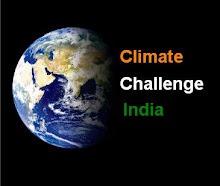When someone says to you, "HOI! This climate change thing... does it BUM you out?", do you say "Climate WHAT?? Like, what are you saying, like yesterday it was, like, so hot and all, today is kewl and all, like, like that? Can I, like, GO now?" and look around frantically for the quickest route away from this pest asking you such, like, questions and all? Dude ... and dudette! It's basic, ya know? You need to know what it is! What it's doing! Why you should, like, CARE! And, what YOU can ... HEY! COME BACK HERE!
See what the temperature and wind and rainfall ... were like yesterday, what they are today, and what they will be four days from now in Bangalore or Dyaamagundlu or Thiruvananthapuram or Srivilliputtur... That is weather. For a short time, for a specific place.
The food you eat has to be grown somewhere. For this you need to know, when to plant, when to water, when apply fertilizer, when to harvest, and all that. Every step is tied to when different seasons occur over large areas.
"Or, to put it another way, weather is what determines what clothes we wear to go outdoors on a given day. Climate is what determines what crops we plant and when we we plant and harvest them."
Long-term weather conditions = climate, yar. You know now?
Climate has not remained constant throughout Earth's history. It has changed over time.
Climate change is a natural phenomenon. It has been going for millennia and will continue to do so. But that natural process occurred over long time periods, gradually, allowing life on Earth to adjust and adapt. Did nothing perish? Of course, it did. A lot! During the past several millennia, human populations have been growing, with more and more growth occurring more recently.
[Source: http://www.globalchange.umich.edu/globalchange2/current/lectures/human_pop/human_pop.html]
As a result of the industrial revolution, increased mass production of commodities from food to machines to cars and other things have led to huge increases in the burning of fossil fuels. Fossil fuesl are called that because they are dead organisms that got converted to liquid or solid forms of carbon and got buried deep in Earth. Since they are forms of carbon, when we burn them to get heat energy, we produce other carbon monoxide and carbon dioxide. We do many other things that produce other kinds of gases such as methane (another carbon-based gas). Everything we do in our modern lifestyle produces such gases. The type and amounts may vary from place to place, but we produce them.
Ultimately, we survive on Earth because we get energy from the Sun! Sun's energy comes to us in the form of radiation. Not all of that energy reaches us here on the surface where we live. Look at what happens to the energy as it makes its way from the upper atmosphere down towards the surface of earth:
[Source: IPCC]
There are many many different ways in which we increase the amount of GHGs into the atmosphere. Burning fossil fuels, cutting down forests, wasting water, using lots of plastics, and so on. Because of human activities, the amount of GHGs in the atmosphere has been increasing VERY fast. This means the greenhouse effect is increasing fast. So global temperature is rising fast. Faster than it would have if we, humans, had not been doing all these GHG-increasing things! We have been QUITE irresponsible.
[Source: http://www.ucar.edu/learn/1_4_1.htm]
When we add those polluting gases (carbon dioxide, methane, etc.), we are changing the composition of the atmosphere. More and more of the heat gets trapped inside the atmosphere instead of escaping into ... well, into out there! This is the principle that is used in greenhouses where plants are grown -- no matter how cold it may get outside, greenhouses remain warm because the carbon dioxide is kept inside and the sun's energy reaching the greenhouse keeps it warmer. The same thing happens with those gases we are putting out into the atmosphere. The effect is similar to what happens in the greenhouse. That is why we call those gases "greenhouse gases" (GHGs).


[Source: IPCC]
Burning fossil fuels is among the biggest sources of GHGs. There are other things we do which contributes to the GHGs in the atmosphere. Check this out:

[Source: IPCC]
Not all fossil fuels are the same. Charcoal and coal put out more GHGs. They also put out black carbon (the soot). Whereas when we burn gas -- propane, butane, etc. ...
What? Nooo! "Indane" is not a kind of gas ... it is a brand name! May I continue, please? Thank you!
When we burn gas, we get more energy with less pollution. This is why I chose today's "Shabaash, India!" candidate!
So, basically this is the deal: climate change is natural, but human activities are making it change much much faster! That is why the current climate change is called "anthropogenic" (anthropo = human, genic = caused by).
Think about this also: if the problem is anthropogenic, the solution is also anthropogenic.
Next time, we will look at some of the impacts of climate change and then return to the topic of anthropogenic solutions.
"Shabhaash, India !"
[Source: http://maydayblog.com/wp-content/uploads/2008/01/bus2.JPG]
The city of New Delhi has made all its public transport CNG-fueled. (CNG = compressed natural gas).
This is a major initiative that needs to spread all over India.
Some other cities are also slowly moving in this direction.
This week, I salute New Delhi for its initiative and say, "Shabhaash, New Delhi!"
[Source: http://www.travelindiasmart.com/images/autorichshaw.jpg]







No comments:
Post a Comment